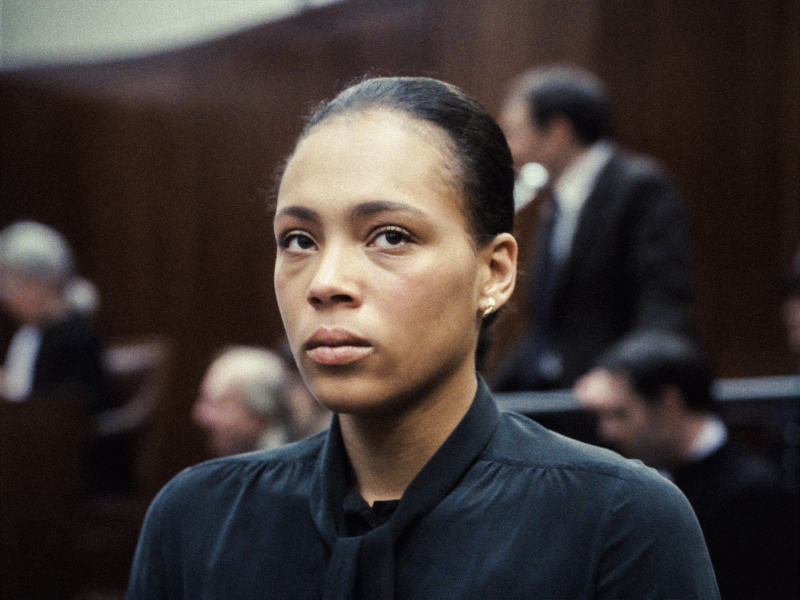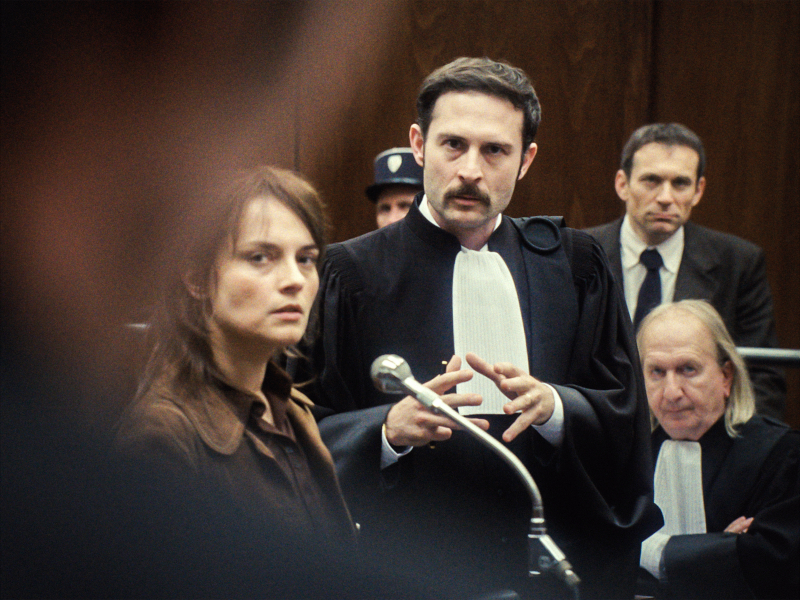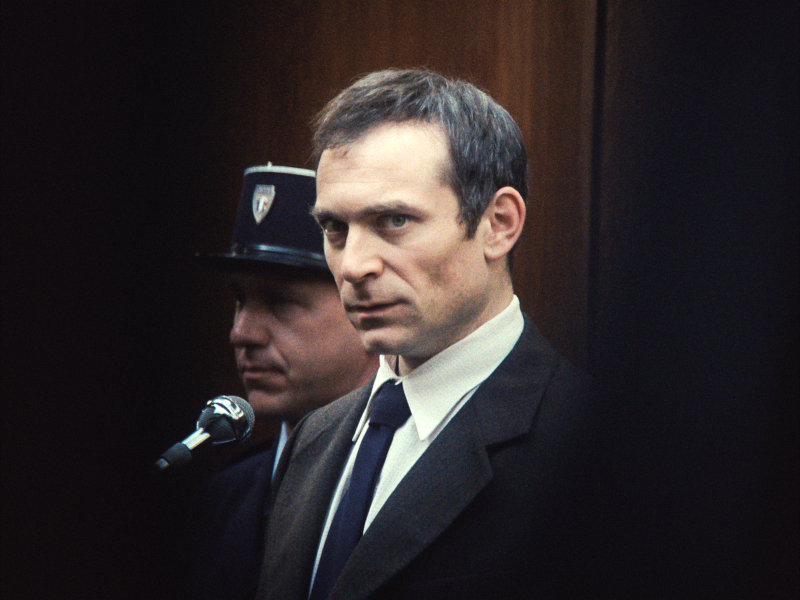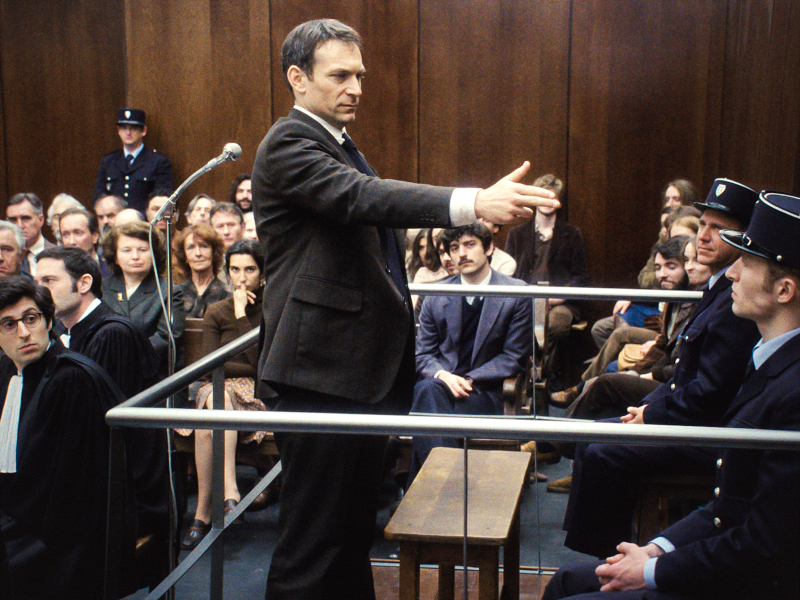Director – Cédric Kahn – 2023 – France – Cert. 12a – 115m
****
An acerbic, left-wing revolutionary in the dock protests his innocence on counts of murder he claims he did not commit – true life, courtroom drama is out in UK and Ireland cinemas on Friday, September 20th
Before this courtroom drama, which is based on an actual trial in 1975 concerning incidents in 1969 and 1970, gets fully under way, and after a brief title card explaining that left wing Jew Pierre Goldman (Arieh Worthalter from Girl, Lukas Dhont, 2018) was imprisoned on four counts of robbery, but insists that he’s not guilty of causing the two deaths in the pharmacy incident, and that a retrial is pending, two of his defence lawyers meet in an office to discuss his decision to drop one of them, M. Kiejman (Arthur Harari from Anatomy of a Fall, Justine Triet, 2023; Onoda: 10, 000 Nights in the Jungle, Arthur Harari, 2021), something neither of the defence lawyers want. Clearly, M. Goldman is a difficult client.

After people arrive in a courtroom thronging with photographers, Goldman is led into the dock, and is immediately met with shouts of “Goldman, innocent” from his supporters. He is dismissive of the judge (Stéphan Guérin-Tillié) and the prosecution (Nicolas Briançon), and adopts a confrontational approach to the court. (In the UK, he would probably be accused of Contempt of Court, but presumably the French legal system is slightly different.) His is furious that his partner Christiane Sucab (Chloé Lecerf), a black woman, and his father (Jerzy Radziwilowicz from Man of Iron, Andrej Wadja, 1981; No End, Krystof Kieslowski, 1985; Man of Marble, Andrej Wadja, 1977), a Polish Jew and former Lyon-based resistance fighter, are put on the stand since their testimonies about him are irrelevant to the fact of his innocence in regard to the pharmacy killings.

While Kiejman proceeds to discredit the witnesses, Goldman rails against police, other witnesses and even the prosecution as racists and fascists, asserting (when asked) that the French police are indeed racist and that “Jews and Blacks are the same” because of the institutional prejudice both groups suffer. Order threatens to break down with chants of “Police Fascists” from his supporters, and during the adjournment, Kiejman and his assistant give Goldman a good talking to. However, he remains unrepentant.
There are still more witnesses to be cross-examined, and their testimonies only serve to further muddy the waters. Then we come to the summing up of various prosecution and defence lawyers. (The French trial system, to those not familiar with it, as most people in the UK won’t be, is complicated and somewhat confusing.) The speech for the prosecution is convincing, if not well-grounded in evidence; the speeches for the defence are even more so. This isn’t a courtroom drama in which the truth slowly emerges and justice can be seen to be done. Rather, the various witnesses – some perhaps lying, being economical with the truth, Some perhaps just plain misremembering – make it more and more difficult to come to a satisfactory overall conclusion about the case.

When the verdict is given – and although there are numerous counts, only the contested ones about the two pharmacy murders for which Goldman declares his innocence are of any interest: he’s confessed to the other counts and those are going to be declared guilty – the two very different reactions of those who wanted him to get off and those who wanted the charges to stick suggest a society polarised between left wing, ethnic minority sympathizers and right wing, racist establishment.
Overall, this proves a very strange viewing experience. (Not a bad experience, but a strange one.) I have no idea, after watching the film once, whether Goldman did or didn’t commit the pharmacy murders. There are moments when I think perhaps he did, then others where I’m swayed the other way. Although the jury verdict is clear. I don’t know enough about French law courts and processes – the procedural aspect of that alone is fascinating – but if it were an English court, I don’t think the charge would have stuck because the evidence is inconclusive.

The whole is gripping, if in places baffling and confusing. It made me want to watch it again, and I did so before writing this review. As courtroom drams go, it’s an extraordinarily gripping and well-researched piece of work which begs questions about the role of the courts in society and whether public bodies such as the police, the judiciary or even the state are (or were in 1975) institutionally racist. Given that most courtroom dramas are Hollywood movies – Twelve Angry Men (Sidney Lumet, 1957) springs immediately to mind – it also furnishes a fascinating glimpse into French courtroom procedure, in which respect it’s as revelatory as The Third Murder (Hirokazu Kore-eda, 2017), which does much the same thing for the Japanese court system.
If you find the complexities and contradictions of court cases compelling, even if no obvious conclusion can be reached, this film is a must. As it is too if you like the proposition that a courtroom and the processes of justice being done tell us something about the values and intrinsic presuppositions of the wider society in which the courtroom is situated. In short, a unique and unusual movie, extremely well thought through, performed and executed, and one well worth your time.
The Goldman Case is out in cinemas in the UK and Ireland on Friday, September 20th.
Trailer:
